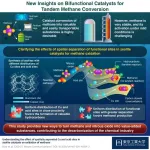(Press-News.org) Copper cannot be mined quickly enough to keep up with current U.S. policy guidelines to transition the country's electricity and vehicle infrastructure to renewable energy, according to a University of Michigan study.
The Inflation Reduction Act, signed into law in 2022, calls for 100% of cars manufactured to be electric vehicles by 2035. But an electric vehicle requires three to five times as much copper as an internal combustion engine vehicle—not to mention the copper required for upgrades to the electric grid.
"A normal Honda Accord needs about 40 pounds of copper. The same battery electric Honda Accord needs almost 200 pounds of copper. Onshore wind turbines require about 10 tons of copper, and in offshore wind turbines, that amount can more than double," said Adam Simon, U-M professor of earth and environmental studies. "We show in the paper that the amount of copper needed is essentially impossible for mining companies to produce."
The study examined 120 years of global data from copper mining companies, and calculated how much copper the U.S. electricity infrastructure and fleet of cars would need to upgrade to renewable energy. It found that renewable energy's copper needs would outstrip what copper mines can produce at the current rate. The study, led by Simon and Cornell University researcher Lawrence Cathles, was published by the International Energy Forum and discussed in a webinar, "Copper mining and vehicle electrification."
The shortfall is in part because of the permitting process for mining companies. The average time between discovering a new copper mineral deposit and getting a permit to build a mine is about 20 years, according to Simon.
Copper is mined by more than 100 companies operating mines on six continents. The researchers drew data for global copper production back to the year 1900, which told them the global amount of copper mining companies had produced over 120 years. They then modeled how much copper mining companies are likely to produce for the rest of the century.
The researchers found that between 2018 and 2050, the world will need to mine 115% more copper than has been mined in all of human history up until 2018 just to meet "business as usual." This would meet our current copper needs and support the developing world without considering the green energy transition.
To meet the copper needs of electrifying the global vehicle fleet, as many as six new large copper mines must be brought online annually over the next several decades. About 40% of the production from new mines will be required for electric vehicle-related grid upgrades.
"I'm a huge fan of the Inflation Reduction Act. I think it's fantastic. I've got solar panels, batteries and an electric vehicle," Simon said. "I'm fully on board with the energy transition. However, it needs to be done in a way that's achievable."
Instead of fully electrifying the U.S. fleet of vehicles, the researchers suggest focusing on manufacturing hybrid vehicles.
"We are hoping the study gets picked up by policymakers who should consider copper as the limiting factor for the energy transition, and to think about how copper is allocated," Simon said. "We know, for example, that a Toyota Prius actually has a slightly better impact on climate than a Tesla. Instead of producing 20 million electric vehicles in the United States and globally, 100 million battery electric vehicles each year, would it be more feasible to focus on building 20 million hybrid vehicles?"
The researchers also point out that copper will be needed for developing countries to build infrastructure, such as building an electric grid for the approximately 1 billion people who don't yet have access to electricity; to provide clean water drinking facilities for the approximately 2 billion people who don't have access to clean water; and wastewater treatment for the 4 billion people who don't have access to sanitation facilities.
"Renewable energy technologies, clean water, wastewater, electricity—it cannot exist without copper. So we then end up with tension between how much copper we need to build infrastructure in less developed countries versus how much copper we need for the energy transition," Simon said.
"We think our study highlights that significant progress can be made to reduce emissions in the United States. However, the current—almost singular—emphasis on downstream manufacture of renewable energy technologies cannot be met by upstream mine production of copper and other metals without a complete mindset change about mining among environmental groups and policymakers."
Study: Copper mining and vehicle electrification
END
Copper can't be mined fast enough to electrify the US
2024-05-15
ELSE PRESS RELEASES FROM THIS DATE:
Guideline issued for people with epilepsy who may become pregnant
2024-05-15
EMBARGOED FOR RELEASE UNTIL 4 P.M. ET, WEDNESDAY, MAY 15, 2024
MINNEAPOLIS – A new guideline has been issued to help neurologists and other clinicians determine the best antiseizure medications for people with epilepsy who may become pregnant. The guideline is published in the May 15, 2024, online issue of Neurology®, the medical journal of the American Academy of Neurology (AAN), and was developed through a collaboration between the AAN, the American Epilepsy Society (AES) and the Society for Maternal-Fetal Medicine (SMFM). It was endorsed by the Child Neurology Society.
The guideline partially updates two 2009 AAN and AES ...
Only 20% of U.S. nonprofit hospitals invested in housing as part of the federal community benefit mandate
2024-05-15
Waltham — May 15, 2024 — A nationwide assessment of how nonprofit hospitals are addressing housing-related needs in their communities appears in the latest issue of Medical Care, the official journal of the Medical Care Section of the American Public Health Association. The journal is published in the Lippincott portfolio by Wolters Kluwer.
"Approximately 60% of hospitals in the United States are 501(c)(3) nonprofit organizations ...
The crystallization of memory: Study reveals how practice forms new memory pathways in the brain
2024-05-15
A new study led by UCLA Health has shown that repetitive practice not only is helpful in improving skills but also leads to profound changes in the brain’s memory pathways.
The research, published in the journal Nature and co-led by Rockefeller University, sought to unravel how the brain’s ability to retain and process information, known as working memory, improves through training.
To test this, researchers tasked mice with identifying and recalling a sequence of odors over the course of two weeks. Researchers then tracked neural activity in the animals as they practiced the task by using a novel, custom-built microscope that can image cellular activity ...
Dartmouth-led study provides new insights into phage therapy design
2024-05-15
Results from a new Dartmouth-led study, involving collaborators at the University of Pittsburgh and Yale University and published in the journal PLOS Biology, are providing new insights into the therapeutic potential of bacteriophage (phage) therapy for treating diseases like cystic fibrosis (CF).
A major challenge of treating people with CF—an inherited disease that causes sticky, thick mucus to build up in the lungs—are the persistent infections the disease causes which can lead to respiratory failure and death.
“Opportunistic ...
This time, it’s personal: Enhancing patient response to cancer immunotherapy
2024-05-15
LA JOLLA (May 15, 2024)—Immunotherapy has revolutionized the way we treat cancer in recent years. Instead of targeting the tumor itself, immunotherapies work by directing patients’ immune systems to attack their tumors more effectively. This has been especially impactful in improving outcomes for certain difficult-to-treat cancers. Still, fewer than half of all cancer patients respond to current immunotherapies, creating an urgent need to identify biomarkers that can predict which patients are most likely to benefit.
Recently, scientists have noticed that patients whose tumors have a mutation in a gene called ARID1A are ...
A novel multifunctional catalyst turns methane into valuable hydrocarbons
2024-05-15
Methane, a greenhouse gas that contributes significantly towards global warming, is also an important source of energy and an essential chemical resource. When used as a chemical feedstock, methane is typically converted into methanol first and then into hydrocarbons. However, this sequential conversion requires complex industrial setups. More importantly, since methane is a very stable molecule, its conversion into methanol requires tremendous amounts of energy when using conventional means, such ...
Two decades of studies suggest health benefits associated with plant-based diets
2024-05-15
Vegetarian and vegan diets are generally associated with better status on various medical factors linked to cardiovascular health and cancer risk, as well as lower risk of cardiovascular diseases, cancer, and death, according to a new review of 49 previously published papers. Angelo Capodici and colleagues present these findings in the open-access journal PLOS ONE on May 15, 2024.
Prior studies have linked certain diets with increased risk of cardiovascular disease and cancer. A diet that is poor in plant products and rich in meat, refined grains, sugar, and salt is associated with higher risk of death. Reducing consumption of animal-based ...
Bluetooth tracking devices provide new look into care home quality
2024-05-15
Wearable Bluetooth devices can shed light on the care that residents of care homes are receiving and which residents are most in need of social contact, according to a new study published this week in the open-access journal PLOS ONE by Carl Thompson of University of Leeds, UK.
In the UK alone, nearly half a million people reside in some form of care home, including long-term care facilities, nursing homes and residential homes. There is no single reliable method that works well to evaluate care home quality, in part because care homes are complex social systems with diverse interacting groups.
In the new study, researchers tested the feasibility of collecting social network ...
Scientists want to know how the smells of nature benefit our health
2024-05-15
Spending time in nature is good for us. Studies have shown that contact with nature can lift our well-being by affecting emotions, influencing thoughts, reducing stress and improving physical health. Even brief exposure to nature can help. One well-known study found that hospital patients recovered faster if their room included a window view of a natural setting.
Knowing more about nature’s effects on our bodies could not only help our well-being, but could also improve how we care for land, preserve ecosystems and design cities, homes and parks. Yet studies on the benefits of contact with nature have typically focused primarily ...
Singing researchers find cross-cultural patterns in music and language
2024-05-15
Language and music may share evolutionary functions. Both speech and song have features such as rhythm and pitch. But are similarities and differences between speech and song shared across cultures?
To investigate this question, 75 researchers—speaking 55 languages—were recruited across Asia, Africa, the Americas, Europe and the Pacific. Among them were experts in ethnomusicology, music psychology, linguistics, and evolutionary biology. The researchers were asked to sing, perform instrumentals, ...



